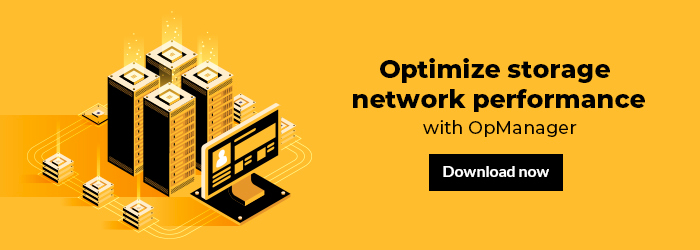Data in your enterprise organization doubles almost every year, and data multiplication at this pace requires boosting your storage capacity. But when the magnitude of data size increases, latency or performance lags are inevitable.
You can outsource your storage infrastructure management to a third-party, but this might place your data at risk from security threats. The correct approach is to install a dedicated storage monitoring solution in your network.
Fair enough! But is it essential? Here are three reasons why you should consider using a storage monitoring tool.
- Typical storage infrastructures include a wide range of devices, like a RAID, or a solid state drive that holds regularly accessed data, and tape libraries which are essential for long-term data storage. However, if you install a separate monitoring tool for each type of storage device in your network, it will cost you heavily.
- Not having a robust storage monitoring tool will cause mismanagement of your storage resources which eventually leads to indiscriminate use of certain devices while leaving the rest underutilized. This can translate into data loss, and early device failure that results in device replacement costs.
- Locating performance issues is a concern. A storage device slowdown can arise due to faulty hardware or configuration issues, and installing storage management software will help you drill down to the root cause of problems.
OpManager’s centralized storage monitoring and support is key
ManageEngine OpManager is a network monitoring tool with default storage monitoring capabilities that improves your network performance by providing extensive support to an array of network devices. OpManager’s built-in monitors are associated with your devices out of the box, ensuring you’ll receive vital availability and performance details automatically.
Storage infrastructure forms a huge part of your network, and OpManager offers vendor-specific, centralized storage monitoring to address your storage device needs.
When choosing a solution that works best for your organization, several other factors should be considered to ensure your organization deploys a one-stop solution for your storage device needs.
Gain visibility and support for all your storage devices
As a single master key pairs with multiple locks, OpManager supports a wide range of storage devices. Administering storage devices is more efficient when vital availability and performance details are provided in a single console based on device type and vendor information.
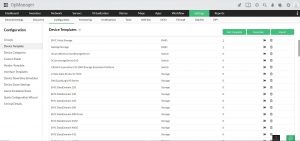
Enhance storage infrastructure performance
A new storage monitoring solution is useful only if investing in it results in enhanced performance. To accomplish this, focusing on storage infrastructure parameters like the following is essential.
- IOPS – The input/output operations per second (IOPS) is a pivotal parameter that measures the number of read and write operations performed for file transfer. A storage device handling too many operations will eventually result in premature device failure.
- Throughput – Throughput is the measure of the speed of data transfer. It tracks the total number packets transferred in a particular time window. Slow performance can be due to low throughput.
- Bandwidth – Bandwidth is the maximum number of data units that can be transferred over a network or internet connection in a given time. A larger bandwidth means large chucks of data are transferred in shorter periods. Monitoring the bandwidth capacity is imperative.
Well, actually enhancing performance doesn’t end with monitoring only these parameters. Storage devices are also dependent on parameters like latency, memory utilization, CPU utilization, and others.
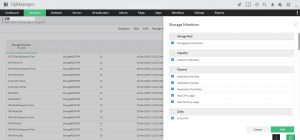
OpManager’s in-built device templates help it to automatically associate monitors to a storage device once it is discovered in the network environment and tracks it for performance.
Utilize demand-based capacity planning
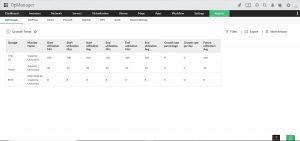
Before investing in expanding your storage capacity, it is advisable to anticipate the possible demands. Forecast Reports in OpManager provides you with precise insights on how your storage needs might grow in the future. This allows you to plan your storage capacity thereby avoiding overspending.
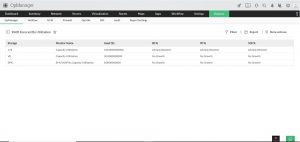
Take a preemptive approach to faults
OpManager provides an effective fault resolution system in alarms and workflow to help you locate and resolve issues. However, to help your business gain a competitive edge, you need to detect and resolve faults proactively.
The Storage Reports in OpManager helps you prevent a fault occurrence. How?
Information becomes crucial, and useful information leads to affirmative action. OpManager constantly records storage device performance and consolidates the data to form intuitive reports that address vital aspects of performance. Analyzing these reports elevates your understanding of storage infrastructure performance, which enables you to locate possible bottlenecks and act on them proactively.
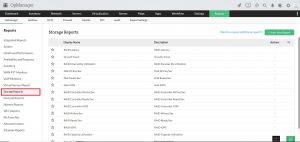
Managing data efficiently and securely is important for the success of any organization. OpManager offers powerful storage monitoring capabilities which enhances performance and maximizes uptime of your storage infrastructure.
Learn more about OpManager, and download a free 30-day trial version. You can also experience a free online demo, or schedule a free, personalized demo with our experts who can answer all your product questions.

